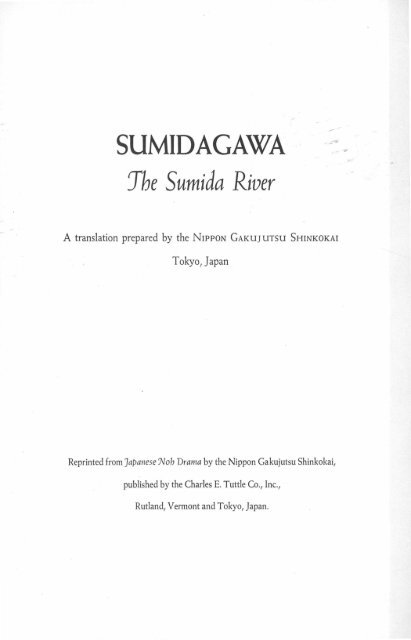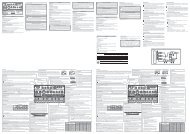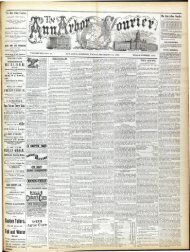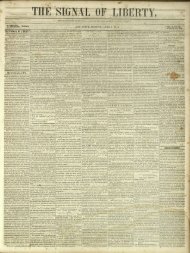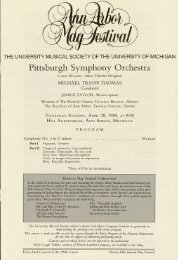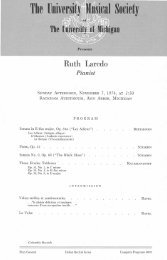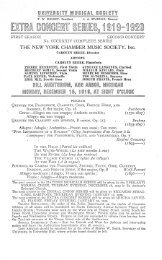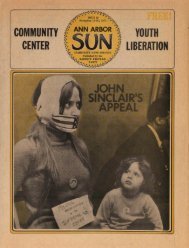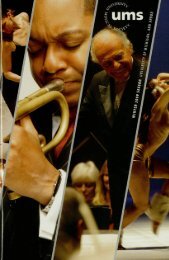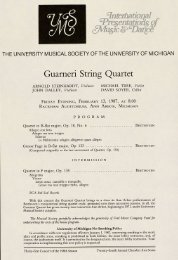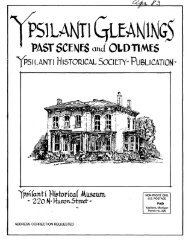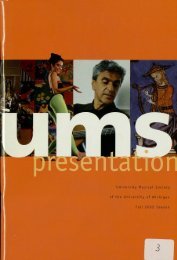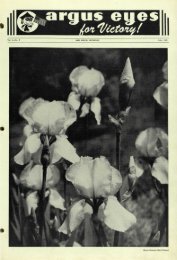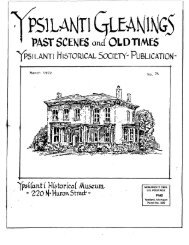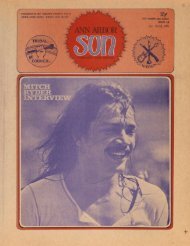SUMIDAGAWA
SUMIDAGAWA
SUMIDAGAWA
You also want an ePaper? Increase the reach of your titles
YUMPU automatically turns print PDFs into web optimized ePapers that Google loves.
<strong>SUMIDAGAWA</strong><br />
The Sumida River<br />
A translation prepared by the NIPPON GAKUJ UTSU SHINKOKAI<br />
Tokyo, Japan<br />
Reprinted from Japanese '].Joh Drama by the Nippon Gakujutsu Shinkokai,<br />
published by the Charles E. Tuttle Co., Inc.,<br />
Rutland, Vermont and Tokyo, Japan.
INTRODUCTION<br />
Sumidagawa belongs to that division of the Fourth Group plays known as<br />
kyoJo-mono or 'mad woman' piece. When they are bereaved mothers, the<br />
heroines in this division are represented as abnormally sensitive and peculiarly<br />
susceptible to their surroundings, and fall into fits of poetic exaltation which expresses<br />
itself by frenzied gestures. When their lost ones are found, their temporary<br />
madness leaves them. In this particular piece, however, the heroine<br />
·discovers her lost child to be dead and the play ends on a tragic note, not<br />
usual in ' mad woman' pieces.<br />
The scene is laid on both banks of the flver Sumida and on the river<br />
itself. The place where the incident is supposed to have occurred is situated· on<br />
the river near the present Asakusa in Tokyo which was then open country. As<br />
the Sumida ferryman is about to row across, a traveller appears, who asks to<br />
be ferried over, and is followed shortly after by a distraught mother who, for<br />
many months, has been seeking her only child. It is a spring evening. At the<br />
sight of white birds floating here and there on the river, the mad woman recalls<br />
a poem in the Ise Monogatari, which awakens in her a frenzied longing for her<br />
child, which finds dramatic expression in a kakeri dance.<br />
The scene that follows takes place on the ferry. Questioned as to the meaning<br />
of the solemn chanting across the river, the ferryman tells the traveller that on<br />
that very day a year before a kidnapped boy was struck down by sudden illness,<br />
and was left by the slaver to die on the roadside. The kind-hearted villagers<br />
who subsequently buried him on the bank of the river are now holding<br />
a memorial service for the repose of his soul. Hearing the sad story, the<br />
mad woman guesses that the child is indeed her long-sought boy and that<br />
she has reached the end of her quest. In the concluding scene the grieving<br />
mother is led to a grassy mound by a willow-tree under which the child was<br />
buried, and is asked by the villagers to lead their prayers to Amida Buddha.<br />
While they are chanting, the child repeatedly appears before her eyes, only to<br />
fade away every time she attempts to clasp him in her arms. Finally as dawn<br />
breaks, the ghost vanishes for ever into the mound, leaving her disconsolate.<br />
145
Author: Jura Motomasa (1395-1459), son of Zeami Motokiyo.<br />
Source: None has as yet been ascertained. It seems likely that the<br />
author based his plot on some ancient legend or contemporary<br />
incident.<br />
146
<strong>SUMIDAGAWA</strong><br />
Persons<br />
FERRYMAN OF THE SUMIDA RIVER<br />
TRAVELLER FRO M MIYAKO<br />
MOTHER, A MAD WOMAN<br />
GHOST OF UMEWAKA-MARU, HER CHILD<br />
Place<br />
Sumida River, Musashi Province<br />
Spring<br />
Season<br />
Waki<br />
Waki-zure<br />
Shite<br />
Kokata<br />
Stage-attendants place a framework mound covered<br />
with willow branches in front of the Orchestra, inside<br />
which the ghost-child is hidden.<br />
While the entrance muszc nanoribue is being<br />
played, the FERRYMAN-OF THE SUMIDA RIVER enters<br />
the stage and stands at the Shite Seat. He wears<br />
a striped kimono, suo robe and trailing divided skirt.<br />
FERRYMAN I am he who rows the ferry across the Sumida<br />
in the province of Musashi. To-day I<br />
must quickly ferry people across the water because<br />
we are holding a solemn memorial service l<br />
1<br />
1 The tomb ofUmewaka is in the precincts of the Mokubo-ji, a small temple on the left bank of the<br />
river Sumida, roughly opposite the present Asakusa_ Since the temple is believed to have been built<br />
after the present play became popular, it is very doubtful the tomb is really that of Umewaka.<br />
147
for someone at the village on the other side<br />
of the river where both priest and laymen are<br />
gathering in great numbers. Mark this well,<br />
all of you!<br />
While the entrance music shidai is being played, the<br />
TRAVELLER FROM MIYAKO enters with a mushroom<br />
hat on. He wears a striped kimono, kakesuo<br />
robe and white broad divided skirt.<br />
TRAVELLER To the far Eastland I am bound,<br />
shidai To the far Eastland I am bound;<br />
Tedious days of travel lie before me.<br />
CHORUS To the far Eastland I am bound;<br />
jidori Tedious days of travel lie before me.<br />
2<br />
Sits dowll ill frollt<br />
of the CHORUS.<br />
TRAVELLER I come from Miyako. I have a friend 111 Remom his hat.<br />
the Eastland and now I am going there to<br />
visit him.<br />
michi-yuki Behind me wrapt in clouds and mists Puts it all agaill.<br />
Lie the mountains I have crossed,<br />
Lie the mountains I have crossed.<br />
Many a barrier have I passed through,<br />
Many a province have I traversed.<br />
Here lies the far-famed Sumida,<br />
And now I have reached the ferry,<br />
And now I have reached the ferry.<br />
Travelling in haste, here I am<br />
at the Sumida ferry and over there<br />
I see a ferry-boat about to leave.<br />
I will make haste and board it.<br />
Hi boatman! I want to get in<br />
your boat.<br />
148<br />
Remo.'es his hnt.
FERRYMAN All right sir! Get in. But first may I ask<br />
you what is the meaning of that unusual noise<br />
from where you have just come?<br />
TRAVELLER It is a crazy woman from Miyako and peo<br />
ple are amused by her mad dancing.<br />
FERRYMAN Then I will delay the ferry-boat for a while<br />
and wait for the mad creature.<br />
MOTHER<br />
sashi<br />
CHORUS<br />
While the entrance music issei is being played, the<br />
MOTHER appears and stops on the Bridgeway by the<br />
First Pine. She wears a Fukai mask, wig, painted<br />
gold-patterned under-kimono, embroidered koshimaki<br />
outer-kimono, broad-sleeved robe. She has on a mushroom<br />
hat, and carries a spray of bamboo.<br />
" Although a mother's mind<br />
May be unclouded,<br />
She well may lose her way<br />
Through love of her child."l<br />
How true that is !<br />
Where does my darling stray?<br />
Shall I ask these travellers?<br />
Does he know bis mother's grief?<br />
" Does not the skyey wind<br />
Whisper to the waiting pines? "2<br />
The MOTHER advances on to the stage and per-<br />
1 Poem by Fujiwara-no-Kanesuke contained in the Gosetlshii.<br />
3<br />
Rises<br />
Sits on the Wan<br />
Seat to the right of the<br />
TRAVELLER.<br />
2 Poem by Lady Kunaikyo included in the Shin Kokinshii. In its complete form it reads:<br />
Has he (tbe lover) not beard tbe saying,<br />
Tbat even tbe wind blowing<br />
Through tbe upper regions of the sky<br />
Does not disdain to visit the pine?<br />
The word' pine' has a double meaning of ' tree' and ' pining heart.'<br />
149
Will my weary quest end here?<br />
Now I have reached the Sumida,<br />
Now I have reached the Sumida<br />
That flows between Musashi and Shimosa.<br />
MOTHER Pray, boatman. Let me get into the boat.<br />
FERRYMAN Where are you from and where are you going?<br />
MOTHER From Miyako I have come in search of<br />
someone.<br />
FERRYMAN Since you are a woman of Miyako and mad<br />
to boot, I will not take you aboard unless you<br />
amuse us with one of your crazy dances.<br />
110THER What a clumsy way of speaking! Since you<br />
are the Sumida ferryman, you should have<br />
answered, "Come on board, for the day is<br />
spent,"l<br />
Yet you refuse a passage<br />
To me, a city lady.<br />
How ill-becoming a Su-<br />
mida boatman<br />
To speak so rudely!<br />
FERRYMAN How like a woman of Miyako to use such<br />
elegan t language !<br />
MOTHER Your words remind me of the poem N arihira<br />
once composed at this very spot.<br />
"0, birds of Miyako,<br />
If you are worthy of your name,<br />
pupil replied that they could not be lamentations over the dead, and told him the story of a bird which<br />
had built its nest on Mt. Han-shan. When the four young birds it had reared had grown up and prepared<br />
to leave the nest, the mother-bird had uttered heart-rending cries not unlike those they were now hearing.<br />
Upon enquiring from the neighbour it turned out that the master had died and that in order to defray<br />
his funeral expenses, the family had been obliged to sell one of the children into slavery, and were now<br />
about to part from him for ever. Confucius praises his pupil for his keenness in distinguishing voices.<br />
1 Quoted from the Ise MOllogatari, chap. viii, where Narihira, the supposed author, describes hi&<br />
travels through the Eastland in search of a place to settle in, after his life in Miyako had become too<br />
unpleasant. The chapter ends with his crossing the river Sumida.<br />
151
Tell me, does my love still live? "1<br />
0, boatman, yonder is a white bird not found<br />
in Miyako. What is its name?<br />
FERRYMAN It is a sea-gull.<br />
MOTHER Row unpoetical! By the sea you may call<br />
it a gull or a plover or whatever you will, but<br />
here by the Sumida river why not "Miyako<br />
bird? "<br />
FERRYMAN Truly I was in the wrong!<br />
MOTHER<br />
FERRYMAN<br />
MOTHER<br />
FERRYMAN<br />
MOTHER<br />
FERRYMAN<br />
MOTHER<br />
FERRYMAN<br />
MOTHER<br />
CHORUS<br />
age-uta<br />
Living in this famous place<br />
'Twas thoughtless of me,<br />
Instead of Miyako-bird,<br />
To call it sea-gull.<br />
So N arihira long ago<br />
Asked, " Is she still alive? "<br />
Remembering his lady in Miyako.<br />
Moved by like yearning,<br />
I am seeking my lost child<br />
In the Eastland.<br />
To long for a sweetheart,<br />
To seek after a lost child,<br />
Both spring<br />
From love.<br />
0, Miyako-bird, I too will ask you,<br />
0, Miyako-bird, I too will ask you,<br />
Is my dear child still living<br />
Somewhere in the Eastland?<br />
I ask and ask, but it will not answer.<br />
Oh, rude Miyako-bird !<br />
I'll call you ' rustic-bird.'<br />
" By the River Rorie<br />
1 Quoted from the same. 'Miyako-bird' is a poetic name for sea-gull.<br />
152<br />
Tums towards the<br />
right.<br />
The MOTHER turns<br />
towards the Waki<br />
Front.
The slaver abandoned the boy by the roadside<br />
and went on his way.<br />
But the people of this neighbourhood, judging<br />
from his appearance that the lad was of<br />
gentle birth, nursed and tended him as best<br />
they could. But perhaps because of his karma,<br />
he grew worse and worse. When he was at the<br />
point of death, we asked him, " Where were<br />
you born, who are you? " " I was born in<br />
Miyako-he replied-at Kita-Shirakawa, the<br />
only child of Lord Yoshida. My father being<br />
dead, mother and I lived alone. Then I was<br />
kidnapped and now am brought to this pass.<br />
Please bury me here by the roadside, so that<br />
passers-by coming from dear Miyako may at<br />
least cast their shadow over my grave: and<br />
plant a willow-tree in memory of me. " He said<br />
these words, calmly, like a man; invoked Amida<br />
Buddha several times, and died. What a piteous<br />
happening! The M OTHER weeps.<br />
There may be some people from Miyako in<br />
this boat. Let them offer prayers for the<br />
repose of his poor soul, even if they are not<br />
relations of the dead lad. Look! While<br />
you were listening to my long and tedious<br />
tale, the ferry has reached the bank. Make<br />
haste and land!<br />
TRAVELLER I will surely remain here to-day and though<br />
I had nothing to do with the lad, I will offer up<br />
a prayer for him.<br />
Going to the Waki<br />
Seat, addresses the<br />
F ERRYMAN and then<br />
sits dowll.<br />
FERRYMAN Come, my mad creature there! Why not Turns alld looks at<br />
the weeping M OTHER.<br />
get out of my boat.? Hurry! How tenderhearted<br />
of you to shed tears over such a story.<br />
154
Please get out of the boat quickly!<br />
MOTHER Boatman, when did the event you have just<br />
told us take place?<br />
FERRYMAN It took place last year, III the third month,<br />
on this very day.<br />
MOTHER What was the lad's age?<br />
FERRYMAN Twelve.<br />
MOTHER<br />
FERRYMAN<br />
MOTHER<br />
. FERRYMAN<br />
MOTHER<br />
His name?<br />
Umewaka-maru.<br />
And his father's name?<br />
Lord Yoshida .<br />
Since then have neither of his parents been<br />
here?<br />
FERRYMAN Nor any of his kin.<br />
MOTHER Much less his mother !<br />
FERRYMAN No, that would have been out of the question.<br />
MOTHER No wonder, neither kin nor parent came.<br />
He was the child<br />
This mad woman is seeking.<br />
Is this a dream?<br />
o cruel fate!<br />
FERRYMAN Who on earth could have dreamt of such<br />
a thing? Until now I thought it was<br />
none of our business. The boy was<br />
your child. You are to be pitied!<br />
Now let me show you where the boy is<br />
buried. Please come with me.<br />
FERRYMAN This is the grave of your dead child.<br />
for his soul's repose, as only you can do.<br />
MOTHER I had hoped against hope<br />
To find my child<br />
5<br />
155<br />
Turns to the<br />
F ERRYMAN.<br />
Lets fall her hat and<br />
weeps.<br />
Puts away his pole<br />
and standing behind<br />
her, helps her out of the<br />
boat, then takes a few<br />
steps towards the<br />
mound.<br />
Pray Goes to the Waki<br />
Seat and sits down.<br />
Moves to the lift,<br />
half facing the mound
0' ercast the shining moon<br />
That should light up the endless night of<br />
life and death.l<br />
Now my eyes see 'how fleeting is this life,<br />
Now my eyes see how fleeting is this life.<br />
6<br />
FERRYMAN Your tears no longer serve; chant but your Stands up, holding<br />
prayers for his repose in the other world.<br />
a disc-like gong and a<br />
wooden hammer,<br />
MOTHER<br />
The moon has risen,<br />
The river breeze is blowing,<br />
The night is at its height,<br />
'Tis time we began our night prayers.<br />
Asking her to join them<br />
They start to beat their gongs.<br />
O'erwhelmed by grief<br />
The mother cannot say her prayer,<br />
But prostrate weeps upon the ground.<br />
FERRYMAN This is not as it should be. However many<br />
MOTHER<br />
people may gather together, it is a mother's<br />
prayers that will rejoice her dead child.<br />
So saying he hands the gong to the<br />
mother.<br />
You say true-<br />
I'll take the gong<br />
For my child's sake.<br />
FERRYMAN Ceasing her moan, in a clear voice<br />
MOTHER She prays with them under the shining<br />
Striking his gong,<br />
turns towards the<br />
MOTHER,<br />
After giuing her the<br />
gong and hammer, he<br />
takes his place in front<br />
of the CHORUS,<br />
Rises and faces the<br />
mound.<br />
1 The full moon is likened to Sakyamuni who dispels the darkness of ignorance and enlightens<br />
mortal minds.<br />
157
o that I might hear his VOIce but once<br />
again!<br />
Namu Amida!<br />
GHOST N amu Amida! N amo Amida !<br />
CHORUS See, his voice and shape!<br />
MOTHER<br />
·MOTHER<br />
GHOST<br />
CHORUS<br />
The GHOST OF UMEWAKA-MARU comes<br />
out of the mound and stands in front oj the<br />
Waki Seat. He wears a flowing black-hair<br />
wig, white broad-sleeved robe and white twill kimono.<br />
Is it you, my child?<br />
Is it you, my mother?<br />
And as she seeks to grasp it by the hand,<br />
The shape begins to fade away;<br />
The vision fades and reappears<br />
And stronger grows her yearning.<br />
Day breaks in the eastern sky.<br />
The ghost has vanished ;<br />
What seemed her boy<br />
Is but a grassy mound<br />
Lost on the wide, desolate moor.<br />
Sadness and tender pity fill all hearts,<br />
Sadness and tender pity fill all hearts!<br />
159<br />
Turns towards the<br />
mound and strikeJ the<br />
gong.<br />
T UTllS towards the<br />
MOTHER.<br />
The MOTHER drops<br />
the gong and hammer<br />
and runs up to the<br />
GHOST, who retreats<br />
and re-enters the mound.<br />
Dazed and weeping, she<br />
looks up and moves two<br />
or three steps towards<br />
the 8bite Pillar. The<br />
GHOST reappears and<br />
stands at the 8bi te<br />
Seat. With stretched<br />
arms the MOTHER runs<br />
towards it, and attempts<br />
to embrace it, but as<br />
the GHOST retreats<br />
again into the mound,<br />
the MOTHER falls,<br />
clasping the empty air.<br />
Rising again she approaches<br />
the mound,<br />
gazing at the willowbranches,<br />
then, disconsolate,<br />
retreats slowly to<br />
the 8hite Pillar and remaillS<br />
there weeping.


